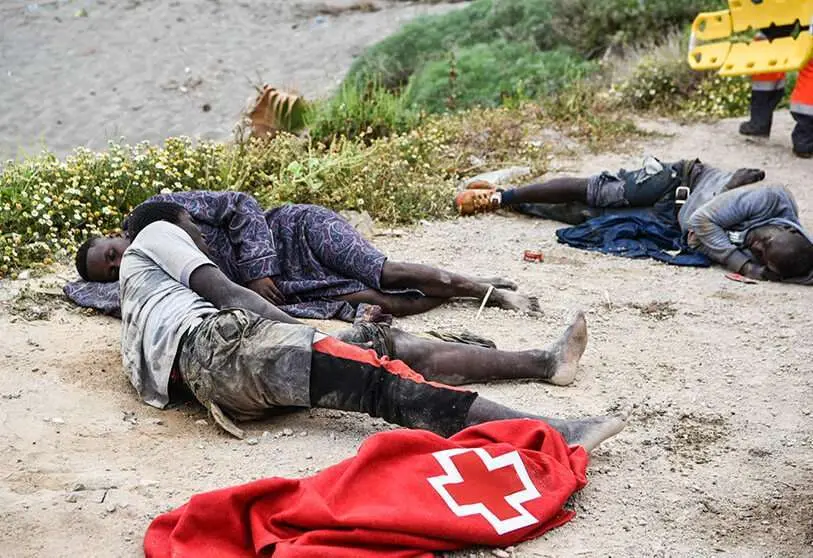Ceuta exposes Morocco and Spain

A 13-year-old boy lying on the ground, his hands trembling, his face covered with sand from the sea and next to him a Red Cross worker trying to revive him. In front of this scene, dozens of people, children, young people and women, in the middle of the Mediterranean Sea struggling to reach the shore, among them a father carrying a baby just a few months old in his arms. We are not reporting on a wave of Syrian war refugees between 2015 and 2017, nor are we reporting on Yemen, which is experiencing daily war and structural famine, nor are we even filming the shores of the failed Libyan state. We are recounting only a fragment of the episode that happened on Sunday night and Monday at the border of Ceuta with Morocco. Yes, with Morocco, the country that officially presents itself as the most stable country in the area, the country considered Europe's partner and an example of economic development in the whole of Africa. However, only a few hours between Sunday and Monday have been able to demolish this image, at least in the media, and replace it with a poor, futureless, repressive and blackmailing Morocco.
In the neighbouring country, two very separate social classes coexist: those who design a country to sell it abroad, and the latter are those who suffer the real policies of the former.
On the one hand, we have the Morocco of the great exploits, the Morocco of the high-speed train, the Morocco of the green Morocco project, the largest port in the Mediterranean, the great producer of solar energy and one of the leaders in green energy, and last but not least, the example to follow in the management of the pandemic.
However, behind this Morocco that is presented in the media, there is what we call the deep Morocco, made up of the majority of the almost 40 million inhabitants. The figures speak for themselves. The latest report by the United Nations Development Programme (UNDP) in collaboration with the Centre for Economic Research at Oxford University in England on the Global Multidimensional Poverty Index for 2019, puts the intensity of deprivation of Moroccans at 45.7%. The report, which highlights where poverty is located in Morocco according to several indicators, notably access to electricity, food, water, sanitation, education or even housing, tools for measuring progress in relation to the Sustainable Development Goals (SDGs), estimates that the percentage of the Moroccan population living in conditions of "severe" multidimensional poverty reaches 6.5%.
While in Morocco the intensity of deprivation of people without access to basic and necessary needs, the percentage reaches 38.8% and 39.7% in Tunisia.
In the Morocco of mega-projects and according to UNESCO, it is one of the "25 least developed countries in terms of education". At the heart of the unequal machine lies, in particular, the education system. "An inclusive and egalitarian system would reduce social disparities and partly erase differences linked to place of origin," the OXFAM report recalls.
According to the report, Morocco's education system is largely failing. The average length of schooling is 4.4 years, two years less than the average for Arab countries.
Morocco, which holds itself up as an example to follow in managing the pandemic, has yet to improve its public health services. This is revealed by a study carried out by the British medical journal The Lancet, which ranked Morocco poorly in the world: out of 195 countries evaluated by the study, the kingdom came 133rd. In this ranking, Morocco is preceded by countries such as North Korea, Tunisia (89th) and Libya (90th).
Moreover, an estimated 1.25 million jobs have been lost.
Above all, what happened in Ceuta shows the dissatisfaction of the majority of Moroccans with the social, economic and political situation in the neighbouring country and is also a clear message from the Moroccan authorities that "we are not only partners in guarding and guarding your borders, but we must also be partners in political issues of great interest such as the Western Sahara".
The message of European Commission president Ursula Von der Layen on the events in Ceuta reflects Europe's lack of clear policies on immigration issues.
Europe has almost all of Africa caged in and with no way out, and its only solution is to pay gendarmes from other countries to stop the immigration of hundreds of thousands fleeing from countries like Morocco or worse, while it is busy extracting their natural resources and supporting their dictatorships.
The message from the Moroccan authorities, as we have to decipher it, is: " How long will we continue to act as watchdogs in your interest and at the same time accept your ego and feeling of superiority "?
If Morocco has been wrong to let its children, young people and women cross the fence into Ceuta, showing how poor it is, Spain has been wrong twice by accepting the Polisario leader as Rabat's first enemy and not valuing the role of those who guard Europe's southern borders. It is Spain's turn to review its real relationship with Morocco, leaving behind its historical prejudices and superior outlook. It is time to treat Rabat as an equal.
